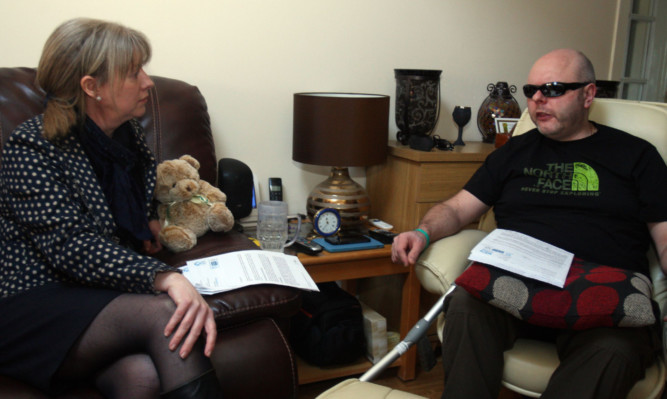Health minister Shona Robison has pledged to ensure training is brought in faster to diagnose rare diseases after meeting an Angus campaigner.
When paramedics were called to Keith Swankie’s Arbroath home recently they confessed they had not even heard of progressive supranuclear palsy (PSP), the terminal illness he suffers from.
The rare neurological disease is caused by the death of nerve cells in the brain and affects eye movement, balance, mobility, speech and swallowing.
Average life expectancy is seven years from the onset of symptoms and it took three years for the 43-year-old to be diagnosed after he first visited his doctor with symptoms.
Now, Ms Robison will tell health board officials to improve training by raising awareness of the condition after meeting Mr Swankie at his house.
The former supermarket manager described the visit as positive but vowed to keep campaigning “like a dripping tap that won’t be switched off” to make sure the Dundee City East MSP follows through on her promises.
Ms Robison said: “I think we can diagnose people more quickly. The fact that it took three years to diagnose Mr Swankie is too long, albeit it is a complex condition and sometimes hard to diagnose. But I think we can do better than that.
“The first thing I said I would do is at the health board chairs’ meeting next week, where I’m going to ask the chairs to have a look within their health board areas at how they can help expedite the training for staff because awareness raising and training is really, really important if we’re going to improve diagnosis and support.”
Mr Swankie, his wife Sheelagh and his two daughters, 19-year-old Nikki and Jordan, 15, have spoken out about the impact PSP has had on their lives and are desperate to raise the profile of the condition, which affects approximately 4,000 people in the UK.
After becoming frustrated with what he saw as a lack of action from previous health minister Alex Neil, Mr Swankie said he felt “confident” Ms Robison would move fast with improvements.
He said: “She agreed that the timescales for some of the things hadn’t been good enough and she has a meeting with the chairs of the health boards next week.
“I feel confident that we will see some action, which is how I measure success, which can only be a good thing for everyone concerned.
“I’m like a dripping tap that won’t be switched off. She said she would email with updates and with what she is driving forward and it was a good exchange. I have a positive feeling about this.”
